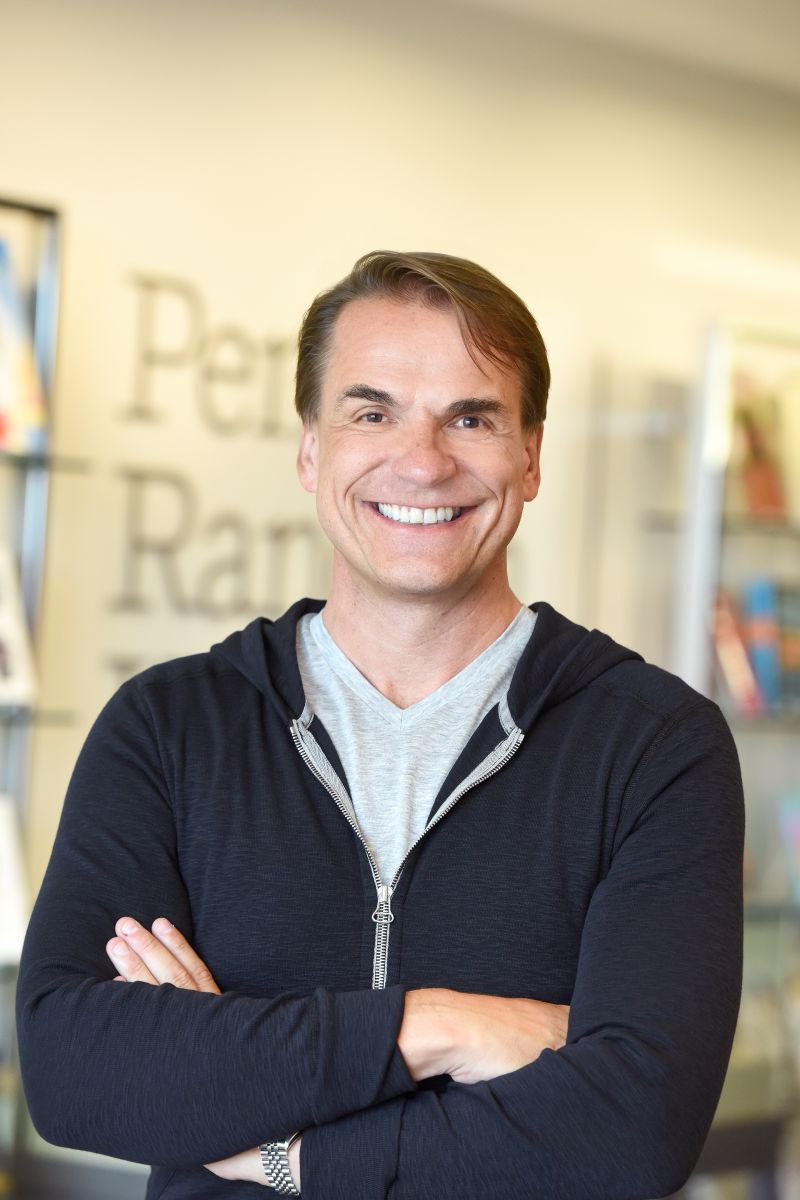You are viewing your 1 free article this month. Login to read more articles.
Decentralised, reader-centric, diverse; Markus Dohle on five years of PRH
Penguin Random House is marking its fifth anniversary since the merger that formed the publisher in 2013. Its global c.e.o. Markus Dohle discusses its achievements, and its plans for the future.
Five years on from the merger, how would you say things stand with Penguin Random House? What would you pick out as having gone particularly successfully? And what has your biggest challenge been when bringing the two companies together?
Five years into the merger, Penguin Random House is in an even better place than I would have ever imagined on 1st July 2013. The merger has been an extraordinary success around the world—culturally, creatively and commercially. I said at the time that mergers often fail. And don’t forget we were talking about the coming together of the two largest trade publishing groups, with leading market positions on all continents where we do business. That made the challenge even greater. But against all odds, ours has been particularly successful. Why? Because of the people involved. We relied on our internal teams and their institutional knowledge and expertise to implement the merger project. They've paved the path for who we are today.
 During the integration, it was especially challenging to create common, yet customised, systems and processes in each territory, but this is where our local teams made all the difference. Soon, we’ll be in shared offices in New York and London, and that will help facilitate even greater collaboration among our teams. It is the last tangible step of the merger, and we are looking forward to that.
During the integration, it was especially challenging to create common, yet customised, systems and processes in each territory, but this is where our local teams made all the difference. Soon, we’ll be in shared offices in New York and London, and that will help facilitate even greater collaboration among our teams. It is the last tangible step of the merger, and we are looking forward to that.
You recently appointed Madeline McIntosh as c.e.o. of Penguin Random House US, freeing you up to focus on your global role. What are your priorities going to be? What particular skills or focus will Madeline bring to guiding PRH US?
As I said when I made the appointment, Madeline is one of the most well-rounded and respected executives in our industry. She and I have long been partners on many levels and in different roles, and already—after just a few months—it feels like a seamless continuation of our established and close partnership.
At the time of the merger five years ago, I decided to directly oversee our business in the US, which is by far our largest territory and, therefore, essential for the overall success of the merger. My international responsibilities in our territories have been expanding in recent years, so the fifth anniversary, and the completion of the integration, was the perfect time to appoint dedicated leadership in our US market as we look to the next phase of our strategy implementation. And that is focusing on international growth, especially in emerging markets, and capitalising on the strength and scale of what we’ve achieved in the first chapter of being Penguin Random House.
In recent public forums (including at the Frankfurt Book Fair), you’ve been very optimistic about the state of the industry, given the long-term trends in world literacy, the growth of children's, the co-existence of "e" and "p", growth in the international markets etc. How much further potential do you see in the areas that are currently seeing outstanding growth—audio, children's?
I am indeed optimistic based on what multiple sources of data show. I joked in Frankfurt that I brought a thick fact book, full of data, to support my optimism, which I knew would surprise some people. I know how hard it feels for all of us to make our books successful in this fragmented media landscape, with declining attention spans and multiple distractions. But it is a fact that book markets have been growing over the past 15 years since the digital transformation of media started. We have a business model for digital content distribution and a healthy coexistence between print and digital formats. And you are absolutely right to mention audio, which is an important growth engine for us globally.
The strength of print formats in recent years has been stabilising the entire book ecosystem—especially the physical retail environment. Our addressable global market and readership—especially for English- language content—is growing substantially every year and demographic change gives us additional tailwind. What’s really heartening is that children’s books have been the fastest-growing segment of our business over the past decade. That’s something to embrace and build on. Our business is one of risk-taking— on every book—and often of failure, but if I look at the broader international publishing landscape, I see a world with many reasons for optimism about the future of books and reading for generations to come.
Talking about international growth, I assume you’d single out South America and China?
Well, I don’t want to single out any of our territories for growth, because we want to grow in all of them. But sure, we operate in some rather mature markets and some developing ones. We are always exploring opportunities to grow, both organically and acquisitively. It’s correct that in recent years we have made major strides in Spain and Latin America, with the acquisitions of Santillana/Alfaguara and Ediciones B in Spanish-language publishing, and our investment in Grupo Companhia das Letras in Brazil.
In China, we’ve been hugely successful with the Peppa Pig property, but we are still figuring out how to broaden our children’s and adult publishing businesses. In July I’ll travel to China for the fourth time in less than two years. It takes time, and laser-focus, to develop our publishing operations in different market environments.
In the autumn, I’ll spend time in the seven countries in Latin America in which we have publishing operations: Mexico, Colombia, Peru, Chile, Uruguay, Argentina and, of course, Brazil. These are indeed growth regions for us, in addition to India, where we’ve had publishing operations for more than 30 years.
Penguin Random House is now a couple of years into its direct-to-consumer approach. Why is this an important strategy for the publisher? What does the future look like in this respect?
I’ve always said that the emergence of e-books and digital audiobooks is not the central element of our digital transformation. They are just additional formats that we can use to reach even more readers globally. We’ve always been format-agnostic: we want to grow both our physical and our digital businesses and reach more readers, in whatever format they prefer. And as I said, we have a robust business model for the digital distribution of our books.
The essence of our digital transformation is to find new paths to our readers, as book sales are shifting more towards e-commerce and online sales channels. We know that, even after 25 years of online book sales, discoverability and visibility of our titles—the experience of browsing and finding the best stories—is still a huge challenge online.
And the flood of new ISBNs and book content makes it even more challenging for consumers to find their next best read.
As publishers, we need to become much more reader-centric and end-consumer-focused in a world in which online sales channels constantly gain market share. We need to be able to listen to readers and understand their preferences, and we have to communicate with them and try to put their next best reads directly in front of them. And we need to do all of that at scale. That means we have to complement our creativity with a more data-driven approach. Without data we won’t be able to reach readers at scale in the future. At the same time, we are working on further optimising the availability of our books in physical retail by increasing our in-stock rates, while reducing return rates. Today we are selling our books through 120,000 retail locations worldwide—and that number is growing.
What approach is PRH taking to the issue of acquiring rights globally?
We have designed and developed PRH as a multi-local company because publishing is a multi-local business. It’s a rights and language business. We want to support and nurture local author and publishing talent and local culture. And we want to participate in the local discourse of the countries we operate in. That’s why we are organised in a very decentralised way, with strong local management teams. At the same time, we strive to expand the international reach of our global brands. So if it makes sense for an author, we want to bring their story to readers everywhere in a co-ordinated and collaborative publishing effort. What drives our thinking is what’s best for the writer and the book—that hasn’t changed, and it won’t change in the future.
There has been a lot of discussion about Amazon and territorial copyright in the UK in the past couple of months, notably in a speech by Charlie Redmayne as president of the Publishers Association. What view do you take?
Amazon is our largest and fastest-growing international customer. Because of the nature of its global business and distribution, copyright issues can occur. And a faster and more efficient international supply chain can support and leverage these issues. We are committed to working with Amazon to resolve and mitigate territorial copyright issues. We try to manage copyright challenges just as we do with piracy in digital formats. So far we’ve been fairly successful in managing piracy in our industry, and I hope we’ll be able to contain the recent territoriality and copyright issues that have emerged in a physical book marketplace that has become increasingly online and global.
How is Brexit likely to affect your business?
It’s too early to say. We hope we won’t be affected in a significant way. We are focused on both our UK and our Continental Europe businesses, and on ensuring they are growing in a healthy, sustainable way.
For our UK publishing, the four most important priorities post-Brexit are: keeping barriers to trade with the EU to an absolute minimum; strong copyright rules to encourage investment in the UK and to protect creators; ensuring that publishers and businesses have access to the people and skills they need; and minimising business and investment uncertainty.
What lessons do you think the recent publication of gender pay gap figures in the UK give us about the publishing industry more broadly and for Penguin Random House in particular?
I was happy to see that the UK survey showed a fair gender compensation for PRH UK. This reflects the effort and attention we put behind all our diversity initiatives, which are a work in progress—and fair gender pay is an especially important one, given the fact that the majority of our employees are female and that publishing is not one of the highest-ranked industries when it comes to compensation anyway. In the US, we were recently named the best midsize employer in the country by Forbes across all industries. Fair compensation and benefits for our employees is an important pillar of our corporate culture—as well as our belief that every employee at PRH should share in the financial success of our local companies.
What should we expect from Michelle Obama’s hotly anticipated book this autumn? How is Barack Obama’s book progressing? Will you be in the market for president Trump’s memoir in due course?
The Obama books are highly anticipated around the world, and we can’t wait to launch them into the world. I believe that Becoming is unlike any other former First Lady’s memoir. It is going to be very inspirational. We haven’t yet announced the publication date for [former] President Obama’s book, but I can tell you that he’s busy writing it. I am personally very much looking forward to reading it. His voice and opinion on what’s happening in the world is essential, and will be meaningful to readers globally.
When it comes to future presidential memoirs, at Penguin Random House our acquisitions are decided by our publishers and editors, not by the c.e.o.














